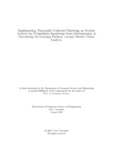| dc.contributor.advisor | Arif, Hossain | |
| dc.contributor.author | Anough, Ahmed Saquif Alam | |
| dc.contributor.author | Hossain, Md. Tahmid | |
| dc.contributor.author | Karim, Kazi Ruzlan | |
| dc.contributor.author | Faruk, Umar | |
| dc.date.accessioned | 2019-10-29T09:44:39Z | |
| dc.date.available | 2019-10-29T09:44:39Z | |
| dc.date.copyright | 2019 | |
| dc.date.issued | 2019-08 | |
| dc.identifier.other | ID 19341020 | |
| dc.identifier.other | ID 14101148 | |
| dc.identifier.other | ID 18241050 | |
| dc.identifier.other | ID 15141003 | |
| dc.identifier.uri | http://hdl.handle.net/10361/12816 | |
| dc.description | This thesis is submitted in partial fulfillment of the requirements for the degree of Bachelor of Science in Computer Science, 2019. | en_US |
| dc.description | Cataloged from PDF version of thesis. | |
| dc.description | Includes bibliographical references (pages 44-48). | |
| dc.description.abstract | Recognizing a growing need to accommodate students of varied backgrounds and account
for individual di erences in learning curves, this paper re
ects on our work to
implement a Temporally Coherent Clustering approach in order to detect the most
optimized pathway for teaching subjects through an MCQ based learning platform.
Standard approaches towards extraction of student activity data typically detect
similar behavior patterns and use simple statistical analysis in order to make predictions
regarding their result. In reality, this causes high noise in the data that
is temporally inconsistent and largely inaccurate. We proposed to work with an
evolutionary clustering pipeline that can be applied to learning data that we have
collected through our Intelligent Teaching System - and aimed at improving cluster
stability over a large data set of student behavior. Initially, we have collected and
worked on BCS Examination related data, where our results show improved cluster
performance of both students and study material, and achieves stability on organic
user data in order to be able to detect behavioral patterns and properties of learning
environments. As an end result of this whole research, we have incorporated
our work into our ITS, which proactively determines student's knowledge level, and
automatically determines the best pathway in order to improve their performance.
Overall, it deliberately in
uences a students capacity improvement in order to passively
enable them to answer harder questions by creating an optimized pathway
that recognizes the need for individualized learning curves. Overall, we managed
to get an accuracy ratio of around 84%, with a silhouette score of 0.53 against an
optimized k value of 5 within our clustering algorithm using k-means. | en_US |
| dc.description.statementofresponsibility | Ahmed Saquif Alam Anough | |
| dc.description.statementofresponsibility | Md. Tahmid Hossain | |
| dc.description.statementofresponsibility | Umar Faruk | |
| dc.description.statementofresponsibility | Kazi Ruzlan Karim | |
| dc.format.extent | 48 pages | |
| dc.language.iso | en | en_US |
| dc.publisher | Brac University | en_US |
| dc.rights | Brac University theses are protected by copyright. They may be viewed from this source for any purpose, but reproduction or distribution in any format is prohibited without written permission. | |
| dc.subject | Temporally coherent clustering | en_US |
| dc.subject | Exam performance prediction | en_US |
| dc.subject | Result prediction | en_US |
| dc.subject | Knowledge level determination | en_US |
| dc.subject.lcsh | Cluster analysis--Data processing | |
| dc.subject.lcsh | Machine learning | |
| dc.title | Implementing temporally coherent clustering on student activity to predict exam performance & optimizing the learning pathway through markov chain analysis | en_US |
| dc.type | Thesis | en_US |
| dc.contributor.department | Department of Computer Science and Engineering, Brac University | |
| dc.description.degree | B. Computer Science | |

